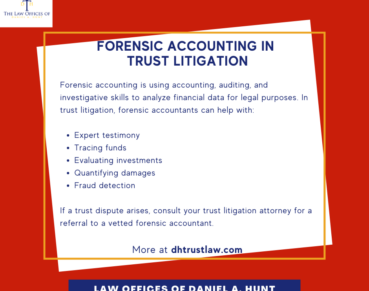What Happens When a Will is Contested?
Many Californians do not have a last will and testament. Taking the time to engage in estate planning can help you protect your assets and ensure your loved ones receive your assets according to your wishes. Unfortunately, there is always a chance that someone will contest a last will and testament. Will contests are more common than most people realize. When one person believes they are entitled to a share in an estate or disagrees with how the estate is going to be distributed, they can contest the will.
Who Can Contest a Will in California?
In California, only interested parties can contest a will. Interested parties are people who would have benefited under an earlier version of the will or heirs of the decedent not included in the current will. The person contesting the will has a right to file an objection with a court to stop the court from probating the will.
After an interested party files an objection to stop the probate process, the proposed executor of the estate needs to inform the following people that there has been a will contest:
- The heirs of the deceased person who are known
- Each person named in the will (if one exists)
- Any alternate executors
Next, there will be a hearing (likely hearings) in front of a judge regarding the will contest. The person contesting the will must provide the court with evidence proving the grounds on which the will contest is based.
For example, suppose a daughter claims that her brother used undue influence over her father. She claims that her brother influenced her father to cut her out of the will. In that case, the daughter would need to provide the court with evidence of the undue influence exerted over her father.
What Happens if Nobody Responds to the Will Contest?
If the people benefiting from the will that is being challenged receive notice of the will contest and do not respond, the case will go ahead without them. In this scenario, the person contesting the will would be able to submit evidence without opposition. Since nobody would be present to challenge the evidence at the hearing, the judge may rule in the objector’s favor. The parties who did not respond would be bound by the court’s ruling in the case.
If you received notice that a will contest is occurring, and you are one of the estate devisees, it is crucial that you discuss your case with a lawyer as soon as possible.
The Court Will Decide Whether to Accept or Reject the Will
At the end of the trial, the probate court judge may choose to accept the will entirely or reject part of the contested will.
- In some cases, the judge will reject the will entirely.
- If the person contesting the will claims another will supersedes the contested will, the judge may decide to enforce the other will.
- When there is only one will, and the judge determines it to be invalid, the probate court will distribute the decedent’s property according to California intestacy laws.
The Legal Grounds for Contesting a Will in California
In California, there are several different legal grounds for contesting the validity of a will, namely:
- The testator who created the will did not have testamentary capacity
- The will was not signed and executed properly
- Another person unduly influenced the testator in creating the will or including certain provisions that benefited them
- Mistake
- Revocation
- Duress
- Fraud
Each of these legal grounds can be difficult to prove. The person contesting the will may need to obtain medical records, witness testimony, and witness’ declarations. Additionally, they may need to hire experts to provide their expert opinions. Contesting a will is not easy and can become an expensive court process.
Will Contests Involving Lack of Testamentary Formalities
According to California law, a beneficiary or potential beneficiary can contest a will in California if the will was not created and executed properly. California requires specific testamentary formalities for a will to be valid. Specifically, California wills must be in writing and signed by:
- The testator who created the will, or
- By another person in the testator’s presence and by their direction, or
- By a conservator according to a court order to make a will according to the California Probate Code
Additionally, the will must be witnessed and signed by the testator during their lifetime. Two additional people must witness the testator signing the will (unless the will is handwritten) and sign the will themselves. The witnesses must be present simultaneously and witness the testator signing the will or the testator’s acknowledgment of the signature of the will.
Will Contests Involving Community Property
Remember that spouses who create a will in California may only devise, or give, their interest in the community property. Most property either spouse acquires after the marriage will be considered community property with a few exceptions, and the surviving spouse will have a right to 50% of it.
If a spouse tries to disinherit the other spouse in a community property state, the spouse is still entitled to 50% of the property. The surviving spouse has a right to contest a will that does not leave them 50% of the property.
Discuss Your Case With a California Will Contest Lawyer Today
If you are involved in a will contest in California, you need experienced legal representation. Contact the Law Offices of Daniel A. Hunt today to schedule your initial consultation and learn how we can fight for your rights.
Law Offices of Daniel A. Hunt
The Law Offices of Daniel A. Hunt is a California law firm specializing in Estate Planning; Trust Administration & Litigation; Probate; and Conservatorships. We've helped over 10,000 clients find peace of mind. We serve clients throughout the greater Sacramento region and the state of California.




